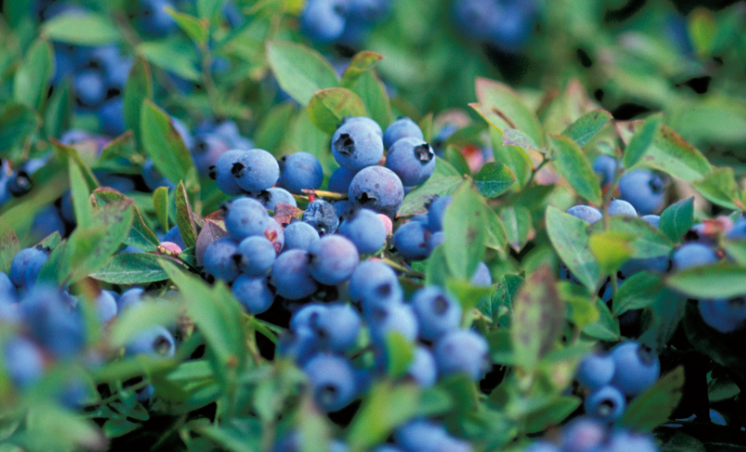New Research Shows Risk of Diabetes May Be Reduced by Eating Blueberries
A breakthrough research study has found that including regular servings of blueberries in one’s diet can have a positive impact on people at risk for Type 2 diabetes, the most common form of diabetes that affects millions of Americans.PORTLAND, Maine (September 16, 2010)
A breakthrough research study has found that including regular servings of blueberries in one’s diet can have a positive impact on people at risk for Type 2 diabetes, the most common form of diabetes that affects millions of Americans. The study, led by Dr. April Stull and Dr. William T. Cefalu of the Pennington Biomedical Research Center at Louisiana State University, adds new information to the body of research supporting the benefits of making blueberries a regular part of a healthy diet.
Published in the October issue of The Journal of Nutrition, Dr. Cefalu’s study found that daily consumption of whole blueberries helped people with a high risk for Type 2 diabetes reduce that risk. The bioactives in blueberries increased the participants’ insulin sensitivity, a key factor in preventing Type 2 diabetes. The reduced risk for diabetes was observed in both men and women, according to the study.
“To our knowledge, this is the first reported human study that evaluated the effect of daily dietary supplementation with bioactives in blueberries on whole-body insulin sensitivity in obese, non-diabetic, and insulin-resistant men and women with such precise metabolic techniques.” wrote Dr. Cefalu.
“Our data suggested that the inclusion of blueberries in the diet of our treatment group as compared to a control group had favorable effects on factors related to the development of diabetes,” noted Cefalu, internationally regarded as a leading diabetes expert. “Diabetes is increasingly a concern in our population, and people should take steps to limit their risk. The evidence continues to grow regarding how effective diet can be in addressing conditions that we observe to be present in pre-diabetetic states.”
Previous research and press accounts about blueberries and in particular Wild Blueberries also have shined a spotlight on how eating antioxidant-rich Wild Blueberries offers numerous potential health benefits, including lowering the risk of cardiovascular disease, preventing memory loss, lowering blood pressure, fighting wrinkles, boosting immune systems, and fighting the effects of aging.
Earlier this year, Health magazine named Wild Blueberries high on its list of “America’s Healthiest Superfoods for Women,” citing the many health benefits gained by eating a diet that includes regular servings of Wild Blueberries. When Cornell University scientists recently tested a number of foods for their antioxidant activity, Wild Blueberries scored the highest marks. Additionally, press ranging from The New York Times Magazine and AARP: The Magazine to Yahoo! Health and CBS News have reported on the natural fruit’s benefits and appeal.
Nutrition Advisor Susan Davis, MS, RD remarked on the results of the Cefalu study: “Dr. Cefalu’s study breaks new ground in terms of how whole foods like blueberries may help prevent serious health conditions like Type 2 diabetes,” she noted. “Study subjects consumed a smoothie every day. This is easily replicated at home. Including blueberries, but particularly Wild Blueberries, due to their higher concentration of anthocyanins, into your daily diet is a smart nutrition choice. Wild Blueberries have so many wonderful properties in a perfect package. These little berries taste great; are easy to add to any meal; and store well in the freezer and retain their taste, texture and nutritional properties. What other food comes close?”
Making Wild Blueberries a regular part of a healthy diet is not difficult, thanks to the convenience offered by frozen Wild Blueberries, available year-round in the freezer case at grocery stores. Frozen Wild Blueberries, as opposed to other types of frozen berries, maintain their flavor, texture, and – most importantly – their nutritional properties. The pearl-sized berries may be eaten whole, blended into smoothies and beverages, added to recipes or sprinkled on cereal or desserts.
For a variety of easy-to-make breakfast, dinner, dessert and drink recipes, visit the Wild Blueberry Association of North America’s web site at www.wildblueberries.com/recipes.
The Wild Blueberry Association of North America is a trade association of growers and processors of Wild Blueberries from Maine and Canada, dedicated to bringing the Wild Blueberry health story and unique Wild Advantages to consumers and the trade worldwide.
For recent news, recipes, and related health information, follow us on Facebook and Twitter.
Subscribe to “Wild About Health Blog”.
Related press releases, headlines, and downloadable images at Front Burner PR.
SOURCE: Wild Blueberry Association of North America
CONTACT: Jen Beltz, FRONT BURNER PR, (207) 699-5502

